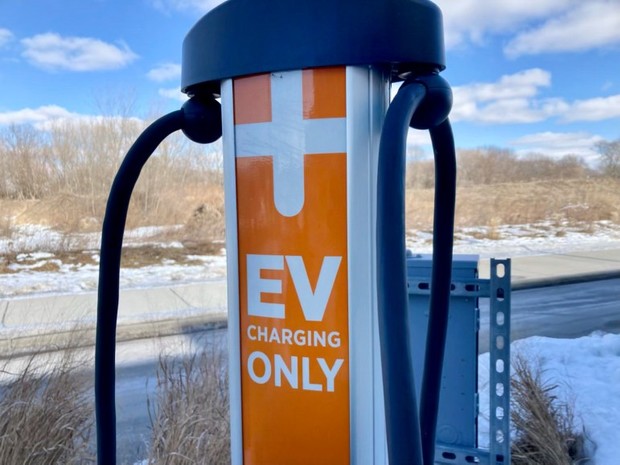Experts Say Wisconsin Unprepared for Electric Vehicles
Federal funds available for charging infrastructure, but first state needs utility law reform.

A ChargePoint electric car charging station sits in the parking lot of Garver Feed Mill in Madison, Wis., on Feb. 12, 2022. As a shift to electric vehicles appears increasingly inevitable, questions loom about who will control and benefit most from the transition. Jim Malewitz/Wisconsin Watch
Electric vehicle experts in Wisconsin are urging state lawmakers and transportation officials to do their part in preparing the state for expanding vehicle charging infrastructure.
The Wisconsin Technology Council hosted a panel this week to talk about the state of electric vehicle technology and related infrastructure. The event was broadcast by WisconsinEye.
Noyce said vehicle makers are working to improve batteries as a remedy to this problem. But he said making charging stations more available is the other half of the solution.
“That’s where the emphasis is going on as we speak,” he said during the panel. “The federal government has jumped into the fray here … because of the market demand, but as well as climate goals, decarbonization, reduction in the use of fossil fuels and so forth.”
He said more federal funding is now available to states to work on electric vehicle adoption, including from the Infrastructure Investment and Jobs Act that was signed into law last November.
To access the funds, Noyce said states like Wisconsin will need to submit an initial plan for where and how they would create a network of charging stations by Aug. 1.
“Wisconsin hasn’t really got going yet (on a plan). So in government sectors… that’s lightspeed in order to get this prepared,” Noyce said during the panel.
“The problem that I’m sure all of you have thought about and the primary driver is revenue,” Noyce said at the Technology Council event. “So how are we going to generate revenue if the fuel tax starts to go away?”
Noyce said efforts will likely focus on building charging infrastructure in the places where people are starting and ending their trips, with a secondary focus on filling in mid-trip stations with the help of federal mapping projects.
But another panelist argued that before the state can create a charging station network, state lawmakers need to fix Wisconsin’s utility laws to clarify who can provide the power.
Art Harrington is a shareholder with law firm Godfrey & Khan who focuses on environmental and energy strategies. He said during the panel that Wisconsin law mandates that only public utilities can provide power directly or indirectly to the public, which has created legal uncertainty for private companies that want to operate vehicle charging stations.
Harrington said there are pros and cons for both large utilities operating charging stations and smaller independent businesses doing so. He said utilities likely have the electricity to power these stations already.
“It probably is a bit more efficient on putting the cost structure over existing facilities. And the pricing generally is regulated by the (state Public Service Commission), so there’s a protection for the consumer if they’re going to regulate the public utilities or regulate the charging stations,” Harrington said during the panel.
But he said the potential downsides of limiting infrastructure to utilities is that it could be a turn off for electric vehicle owners who are interested in reducing their carbon footprint.
“If you have an (electric vehicle), you want to be proud, right? That what I’m driving is good for the environment. And boy, if you do a lifecycle analysis, if I’m going to the utility and they’ve got a fossil base load, how does that look?” he said.
But Harrington said relying on the private sector means the Public Service Commission won’t be able to regulate the stations and what they’re charging consumers.
“If they’re not a public utility, the cost structure is the Wild Wild West, right? It’s competition,” he said.
Harrington said Wisconsin needs legislation to clarify these issues and keep up with the continued momentum behind electric vehicles.
Listen to the WPR report here.
Electric vehicle experts encourage Wisconsin lawmakers, officials to prepare for expanding charging infrastructure was originally published by Wisconsin Public Radio.
If you think stories like this are important, become a member of Urban Milwaukee and help support real, independent journalism. Plus you get some cool added benefits.





















